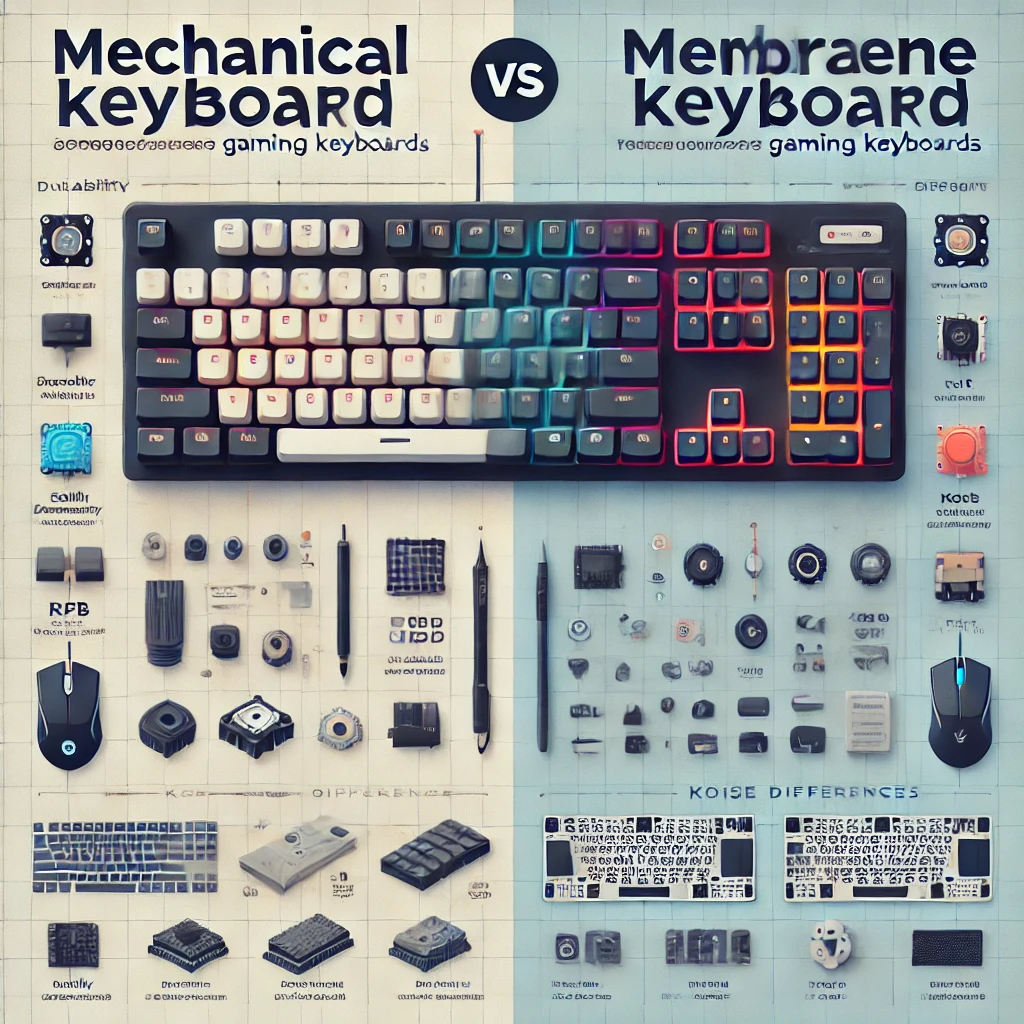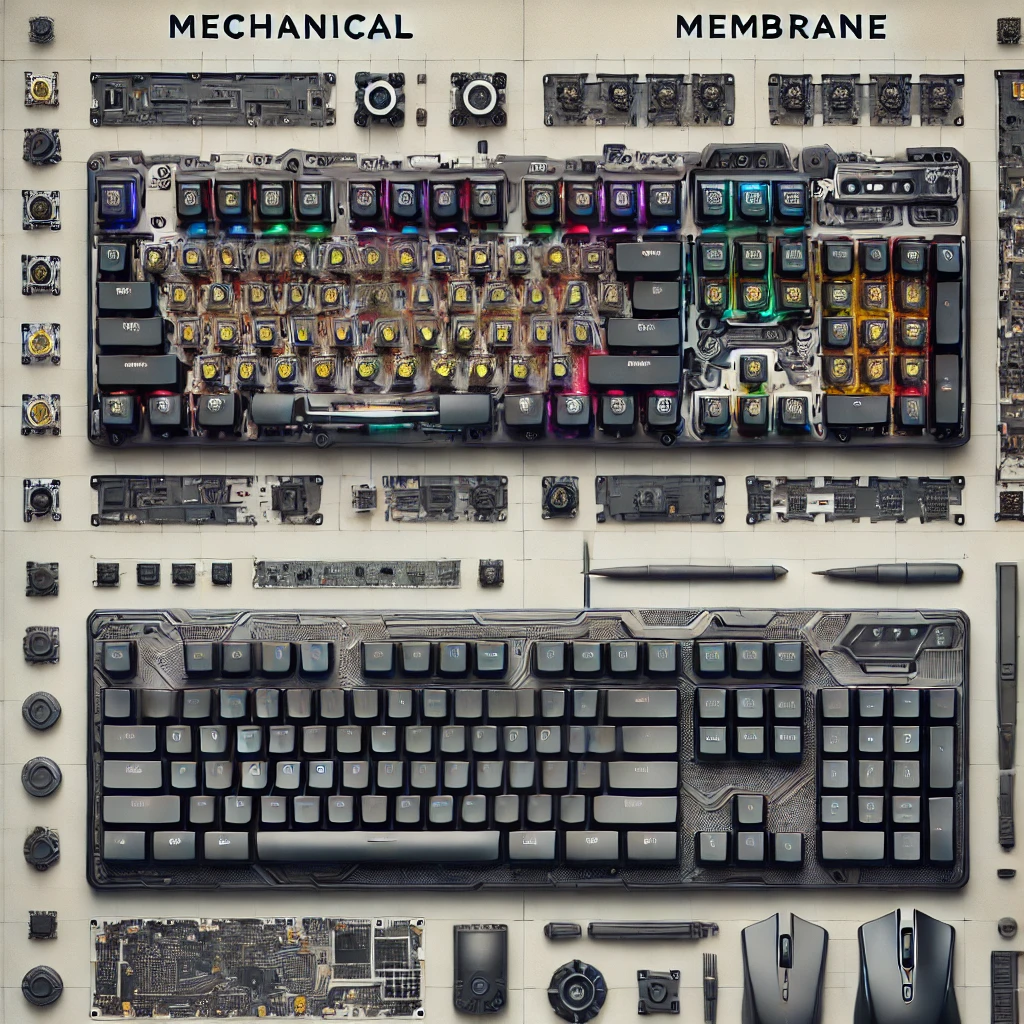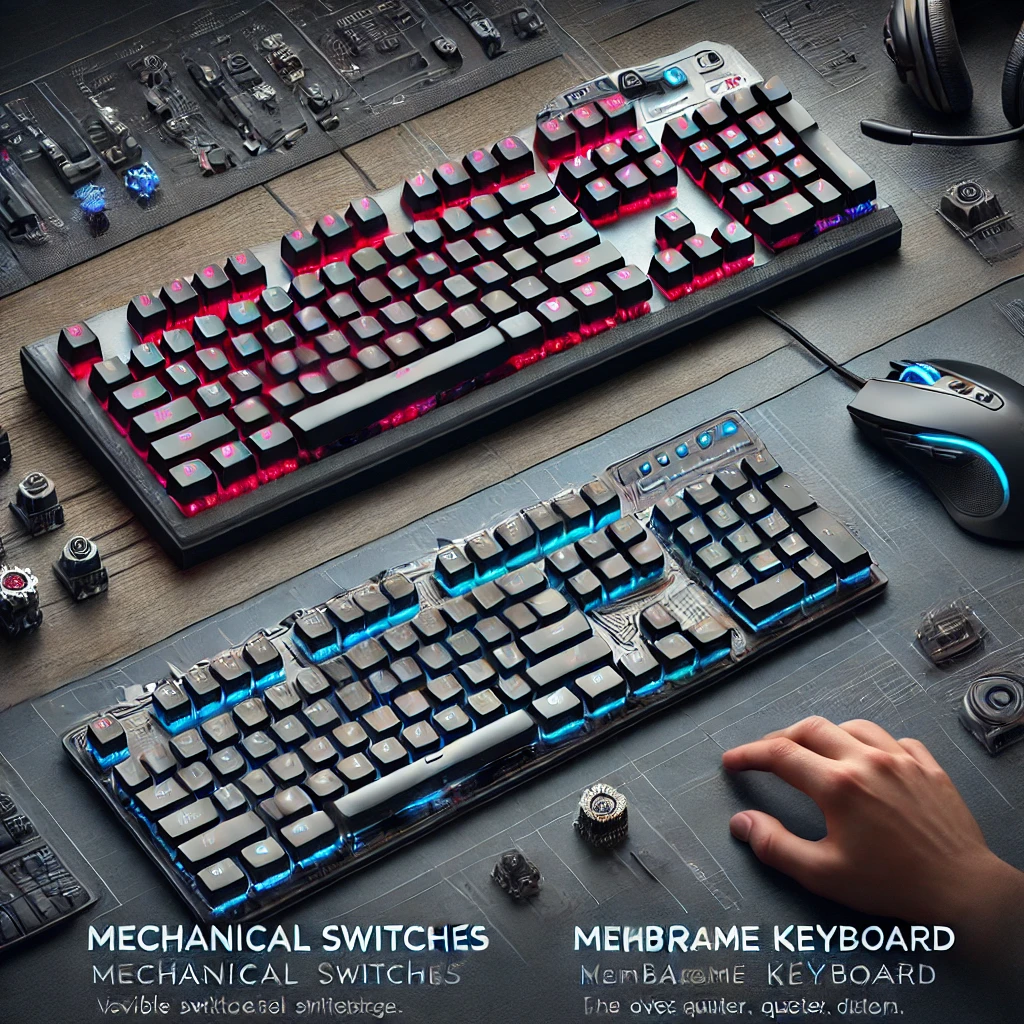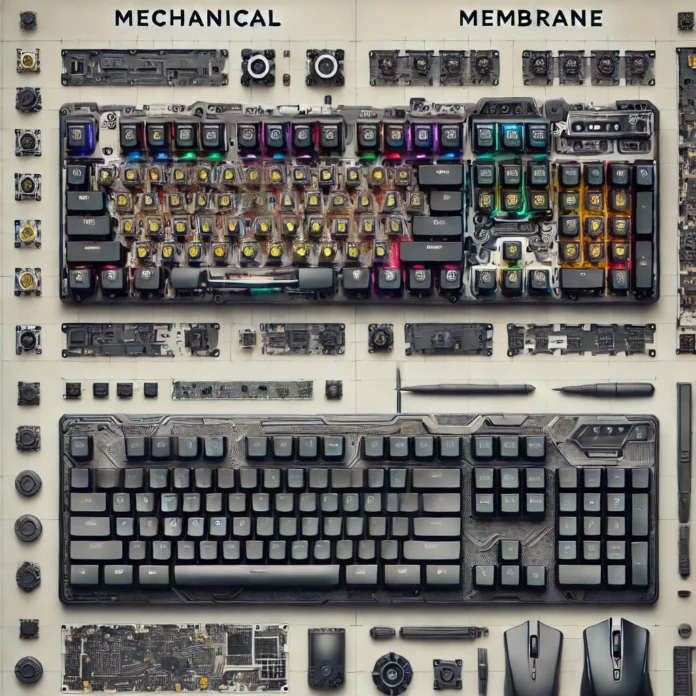A gaming keyboard is more than just a tool—it’s a vital part of every gamer’s setup. Whether you’re grinding through intense FPS matches or exploring immersive RPG worlds, the right keyboard can elevate your gaming experience by providing responsiveness, comfort, and durability. However, choosing the perfect gaming keyboard isn’t always straightforward. One of the most debated topics in the gaming community is the choice between mechanical vs. membrane keyboards. Mechanical vs Membrane Keyboards for Gaming
Mechanical keyboards are praised for their tactile feedback, faster response times, and long-lasting durability, while membrane keyboards are known for their affordability, quieter operation, and lightweight design. But which one is truly better for gaming? The answer depends on various factors, such as your gaming style, budget, and personal preferences.
This article dives deep into the key differences between mechanical and membrane keyboards, breaking down their performance, comfort, and cost. Whether you’re a competitive gamer looking for an edge or a casual player seeking value, this guide will help you make an informed decision. By the end, you’ll know exactly which keyboard type suits your gaming needs and why choosing the right one can enhance your overall gaming experience.

What Are Mechanical and Membrane Keyboards?
Choosing the right keyboard for gaming begins with understanding the two main types: mechanical keyboards and membrane keyboards. Each offers distinct features, and the choice often comes down to your gaming preferences and budget.
Mechanical Keyboards
Mechanical keyboards are celebrated for their precision and durability, making them a favorite among gamers. These keyboards operate using individual mechanical switches under each key. Each switch consists of a spring and a housing mechanism that registers a keystroke with tactile or audible feedback, depending on the switch type.
The tactile feedback from mechanical keyboards ensures a satisfying typing experience, especially for gamers who need accuracy in fast-paced scenarios like FPS or RTS games. Additionally, the customizable switches allow users to choose between options such as linear, tactile, or clicky switches to suit their gaming needs. With an impressive lifespan of up to 50 million keystrokes per key, mechanical keyboards are built for long-term use, making them a worthwhile investment for serious gamers.
Membrane Keyboards
Membrane keyboards, on the other hand, rely on pressure pads and conductive traces to register keystrokes. These keyboards are designed with a single, soft membrane layer beneath the keys, resulting in a quieter and lighter operation compared to mechanical keyboards.
A key advantage of membrane keyboards is their affordability. They are an excellent choice for casual gamers or those looking for a budget-friendly gaming keyboard. However, membrane keyboards tend to have a shorter lifespan and less tactile feedback, which might be less suitable for competitive gaming.
Understanding the core differences between mechanical and membrane keyboards is the first step in deciding which is best for your gaming style. Each type offers unique benefits, and your choice will depend on what matters most: performance, durability, or cost.
Key Differences Between Mechanical and Membrane Keyboards
When choosing between mechanical and membrane keyboards for gaming, understanding their key differences is essential. Let’s break it down by important factors like build, typing feel, durability, noise, and price.
Build and Design
Mechanical keyboards are known for their robust construction, often made with durable materials and featuring a heavier build. This makes them sturdy and long-lasting, ideal for gamers who need reliable equipment. On the other hand, membrane keyboards are lighter and slimmer, making them more portable and space-saving, which is great for casual gamers or those with limited desk space.
Typing Feel and Feedback
Mechanical keyboards shine in the feedback department. They provide tactile or audible feedback, depending on the switch type (e.g., linear, tactile, or clicky). This feedback not only enhances typing accuracy but also improves responsiveness in gaming. In contrast, membrane keyboards offer softer, mushier keypresses with minimal feedback. While this may suit casual users, it can feel less precise during fast-paced gaming.
Durability and Lifespan
Performance for Gaming
One of the most significant differences lies in durability. Mechanical keyboards are built to last,
When choosing between mechanical and membrane keyboards for gaming, performance is often the deciding factor. Each type offers unique characteristics that cater to different gaming styles and needs.
Mechanical Keyboards
Mechanical keyboards are renowned for their superior performance in gaming, particularly in fast-paced and competitive genres. One of their standout features is faster actuation and responsiveness, which can make all the difference in games like FPS (First-Person Shooters) or RTS (Real-Time Strategy). The tactile feedback and distinct actuation point provided by mechanical switches allow players to execute commands more precisely and quickly.
Another advantage is the inclusion of key rollover and anti-ghosting capabilities. Key rollover ensures that multiple key presses register simultaneously, a critical feature for games requiring complex input combinations, such as MOBAs or MMORPGs. Anti-ghosting prevents unintended key presses, ensuring that every input is accurate during high-pressure gaming moments.
For competitive gamers, mechanical keyboards are often the preferred choice, as their performance can directly impact gameplay.
Membrane Keyboards
While membrane keyboards may not match the responsiveness of their mechanical counterparts, they are still adequate for casual gaming. These keyboards perform well for slower-paced games or for players who prioritize affordability over top-tier performance.
However, membrane keyboards have limitations in responsiveness, particularly in fast-paced games where quick reflexes are crucial. Their lack of key rollover and anti-ghosting features can result in missed inputs or inaccuracies during intense gameplay, making them less suitable for competitive gaming environments.
In summary, if you’re a casual gamer or on a tight budget, a membrane keyboard may suffice. But for gamers seeking precision, speed, and reliability in performance, a mechanical keyboard is the better choice.
Comfort and Ergonomics
When choosing between mechanical and membrane keyboards for gaming, comfort and ergonomics play a significant role in determining the best fit for your needs. Long gaming sessions demand a keyboard that minimizes strain and maximizes comfort. Let’s explore how each type performs in this area.
Mechanical Keyboards
Mechanical keyboards are designed with ergonomics in mind, often featuring additional accessories like wrist supports and adjustable key layouts. These features are particularly beneficial for reducing hand and wrist fatigue during extended use.
One of the standout advantages of mechanical keyboards is their tactile feedback. The actuation force and distinct keypress feedback make typing and gaming more comfortable by requiring less effort to confirm each keystroke. This feature not only enhances precision in fast-paced games but also reduces strain on your fingers over time. Additionally, many high-end mechanical keyboards include customizable layouts, allowing gamers to optimize their setup for personal comfort.
Membrane Keyboards
Membrane keyboards, on the other hand, are lightweight and compact, making them easy to move or reposition during gaming sessions. This portability can be a bonus for gamers who travel or frequently rearrange their gaming setup.
However, membrane keyboards require more force to press keys fully, especially after prolonged use, as the pressure pads begin to wear out. This extra effort can lead to increased hand fatigue over time, particularly for gamers who play for hours on end. While their simplicity and lighter build might suit casual gamers, they lack the ergonomic enhancements found in mechanical models.
Ultimately, when evaluating comfort and ergonomics, mechanical keyboards often provide a more gamer-friendly experience due to their tactile feedback and ergonomic add-ons. Membrane keyboards, while portable, may not offer the same level of comfort for extended gaming sessions.
Customization and Aesthetics
When it comes to gaming keyboards, customization and aesthetics play a huge role in enhancing both the user experience and the overall gaming setup. Let’s dive into the customization options available for both mechanical and membrane keyboards.
Mechanical Keyboards
Mechanical keyboards are renowned for their extensive customization options, making them a popular choice among gamers who value personalization. One of the key advantages of mechanical keyboards is the wide variety of switch types available. These include linear, tactile, and clicky switches, each offering a distinct typing feel and sound profile. Linear switches provide smooth keystrokes without any tactile feedback, ideal for fast, uninterrupted key presses. Tactile switches, like Cherry MX Browns, offer feedback with a small bump, helping gamers feel the actuation point. For those who enjoy an audible click, clicky switches provide a satisfying sound, but they may not be suitable for quiet environments.
In addition to switch customization, mechanical keyboards often come with options for custom keycaps. Players can choose from a variety of materials, colors, and designs to make their keyboard truly unique. Many mechanical keyboards also feature RGB lighting, allowing users to adjust the color scheme or set up lighting effects to match their gaming setup. Furthermore, mechanical keyboards often offer programmable keys, enabling users to create macros or assign specific functions to any key, which can be a game-changer in fast-paced gaming scenarios.
Membrane Keyboards
While membrane keyboards offer fewer customization options, they still provide some basic aesthetic features. Many membrane models come with single-color backlighting or basic RGB lighting, allowing for some level of visual appeal. However, the customization is generally limited compared to mechanical keyboards. Additionally, membrane keyboards typically lack the ability to swap out keycaps or change switches, making them less customizable for those who enjoy fine-tuning their gear.
In summary, if you’re looking for a highly customizable and aesthetically pleasing keyboard, mechanical keyboards offer a far superior experience, while membrane keyboards provide basic, functional aesthetics at a more affordable price point.
Pros and Cons of Each Type
When choosing between mechanical and membrane keyboards for gaming, understanding the pros and cons of each can help you make an informed decision.
Mechanical Keyboards
Pros:
1. Durability – Mechanical keyboards are built to last, with switches that can handle up to 50 million keystrokes. This makes them ideal for avid gamers who spend hours playing daily. The robust construction of mechanical keyboards also ensures they withstand heavy use over time.
2. Responsiveness – One of the key advantages of mechanical keyboards for gaming is their superior responsiveness. Each key press is registered quickly, which is crucial in fast-paced games like FPS and RTS. The tactile feedback you get from mechanical switches also allows for better accuracy and quicker reactions, giving you an edge in competitive gaming.
3. Customizability – Mechanical keyboards offer a range of switch types (e.g., tactile, linear, and clicky) that allow gamers to personalize their experience. You can also customize keycaps, lighting, and even program keys for specific actions, making mechanical keyboards highly adaptable to your gaming preferences.
Cons:
1. Expensive – Mechanical keyboards tend to be pricier than membrane models due to their advanced technology and premium build quality. While they provide better performance, the higher price tag can be a deterrent for budget-conscious gamers.
2. Louder – The audible sound produced by mechanical switches, especially clicky ones, can be disruptive in shared spaces. If noise is a concern, it may be worth considering quieter switches or membrane alternatives.
3. Heavier – Mechanical keyboards are generally heavier than membrane keyboards, making them less portable. If you need a keyboard that’s easy to carry around, this could be a downside.
Membrane Keyboards
Pros:
1. Affordable – Membrane keyboards are typically more budget-friendly compared to mechanical ones. They’re an excellent option for casual gamers or those just starting out who don’t want to invest too much in gaming peripherals.
2. Quieter – Membrane keyboards are generally quieter than their mechanical counterparts, making them ideal for shared living spaces or late-night gaming sessions when you don’t want to disturb others.
3. Lightweight – Membrane keyboards are lighter and slimmer, making them more portable. If you need a keyboard for on-the-go gaming, a membrane model could be the perfect solution.
Cons:
1. Shorter Lifespan – The lifespan of a membrane keyboard is generally much shorter, with most models only lasting for around 5-10 million keystrokes. This can be a significant drawback for gamers who play frequently and need a long-lasting keyboard.
2. Less Responsive – While membrane keyboards can handle casual gaming, they aren’t as responsive as mechanical keyboards. The key presses feel mushier and may not provide the same level of accuracy required in fast-paced or competitive gaming.
3. Minimal Customization – Membrane keyboards offer fewer customization options. They typically have basic features, like limited backlighting and fewer switch variations, which makes them less adaptable to personal gaming preferences.
In conclusion, both mechanical and membrane keyboards have their own set of strengths and weaknesses. Understanding these can help you choose the right one based on your gaming style, budget, and performance needs.
Which Keyboard is Best for You?
Choosing between a mechanical and a membrane keyboard ultimately depends on your gaming habits, budget, space, and noise tolerance. Both types of keyboards have their advantages, but understanding what matters most to you will help guide your decision.
Factors to Consider:
Gaming Habits: If you’re a competitive gamer or enjoy fast-paced games like FPS (first-person shooters), a mechanical keyboard is the better choice. Its quicker response time, tactile feedback, and anti-ghosting features give you a competitive edge. On the other hand, if you game casually or play less demanding titles, a membrane keyboard will suffice without sacrificing too much performance.
Budget: Mechanical keyboards tend to be more expensive than membrane models. If you’re looking for an affordable option, a membrane keyboard will give you great value without breaking the bank. However, if you’re willing to invest more for better performance and durability, a mechanical keyboard is well worth the price.
Space: Mechanical keyboards are generally bulkier due to their robust design and individual switches. If you’re working with limited desk space, a more compact membrane keyboard might be the ideal solution.
Noise Tolerance: Mechanical keyboards can be loud, especially those with clicky switches like Cherry MX Blue. If you’re gaming in a shared space or prefer a quieter experience, a membrane keyboard’s softer, quieter keypresses might be more suitable.
Who Should Choose Mechanical Keyboards?
Competitive gamers, enthusiasts, and streamers often opt for mechanical keyboards due to their durability, fast key actuation, and customizable features. The tactile feedback and key rollover capabilities can make a significant difference in fast-paced, high-stakes gaming environments.
Who Should Choose Membrane Keyboards?
Casual gamers, budget-conscious buyers, and those in shared spaces will find membrane keyboards to be a great choice. They offer a quieter experience, are more affordable, and still provide decent gaming performance.

Hybrid Keyboards: A Middle Ground
Hybrid keyboards, also known as membrane-mechanical keyboards, combine the benefits of both mechanical and membrane switches. These keyboards aim to offer a balance between the tactile feedback of mechanical switches and the quieter, more affordable nature of membrane designs. They provide a middle ground for gamers who want a solid performance without the higher price tag of full mechanical keyboards.
Features and Advantages of Hybrid Models
Hybrid keyboards typically feature membrane switches that are enhanced with mechanical-like tactile feedback. This setup allows for a more responsive typing experience compared to standard membrane keyboards, while still maintaining a quieter operation. Many hybrid models also offer customizable RGB lighting, ergonomic designs, and programmable keys, making them attractive for gamers who enjoy a bit of personalization in their setups.
One key advantage of hybrid keyboards is their durability. While they might not last as long as fully mechanical models, they still generally offer a longer lifespan than standard membrane keyboards. These keyboards are also less noisy, which can be a huge benefit for gamers who share a space with others or those who stream and don’t want excessive keyboard noise.
When to Consider This Option
Hybrid keyboards are ideal for gamers who want a blend of both worlds. If you’re on a budget but still want some of the responsive benefits of mechanical switches, a hybrid model could be a great choice. They’re also perfect for those who prioritize quieter operation without sacrificing performance. Hybrid keyboards are also an excellent choice for casual gamers who might not need the full benefits of a high-end mechanical keyboard but still want something more advanced than a traditional membrane keyboard.
In summary, hybrid keyboards provide a cost-effective solution that balances performance and noise control, making them a compelling option for many gamers.
Popular Models to Consider
When choosing between mechanical and membrane keyboards for gaming, it’s essential to look at models that suit your needs and budget. Here are some popular options across both types of keyboards, as well as hybrid models that offer a balance of both.
Recommended Mechanical Keyboards
1. Razer BlackWidow V3
One of the most popular mechanical keyboards for gaming, the Razer BlackWidow V3 features Razer’s Green switches, offering tactile feedback and audible clicks for those who enjoy a responsive typing experience. The customizable RGB Chroma backlighting and durable build make it an excellent choice for gamers.
2. Corsair K95 RGB Platinum XT
Known for its premium build and responsive Cherry MX switches, the Corsair K95 is a high-performance mechanical keyboard designed for serious gamers. Its programmable macro keys, RGB lighting, and robust durability make it ideal for competitive gaming.
3. Logitech G Pro X
Featuring swappable switches, the Logitech G Pro X is highly customizable, allowing gamers to choose the type of switches that best suit their gameplay style. It’s compact, durable, and designed for esports professionals.
Recommended Membrane Keyboards
1. Logitech G213 Prodigy
If you’re looking for a budget-friendly option, the Logitech G213 is an excellent choice. It offers membrane switches that mimic mechanical key presses, with RGB lighting and programmable keys, providing a solid gaming experience at a more affordable price.
2. Razer Cynosa V2
Another great membrane option, the Razer Cynosa V2 features Razer’s membrane switches that offer a soft, quieter typing experience. With dedicated media controls and customizable lighting, it’s perfect for gamers on a budget who still want a premium feel.
Hybrid Keyboards
1. Razer Ornata V2
The Razer Ornata V2 combines membrane and mechanical elements to offer a unique hybrid experience. It features Razer’s mecha-membrane switches, which provide the tactile feedback of a mechanical keyboard with the softer feel of a membrane one, ideal for those who want the best of both worlds.
2. Cooler Master MS120
The Cooler Master MS120 is an affordable hybrid keyboard that offers membrane switches with mechanical-style feedback. It’s designed for gamers who want the responsiveness of mechanical switches but with a quieter, softer keypress.
Maintenance Tips for Both Types of Keyboards
Each of these models offers different advantages, so choose based on your gaming style, budget, and preference for typing feedback. Whether you go for a mechanical, membrane, or hybrid model, you’ll find a keyboard that enhances your gaming experience.
Proper maintenance of your gaming keyboard, whether mechanical or membrane, can significantly extend its lifespan and ensure consistent performance. Here’s how to clean and care for both types:
How to Clean and Care for Mechanical Keyboards
Mechanical keyboards are known for their durability, but they still require regular maintenance. Start by turning off or unplugging the keyboard to avoid accidental key presses. To clean the surface, use a microfiber cloth to wipe away dust, dirt, and oils from your hands. For deeper cleaning, gently remove the keycaps using a keycap puller (a small tool often included with mechanical keyboards). Once removed, you can soak the keycaps in warm, soapy water and scrub them gently with a soft brush to remove grime.
Next, use compressed air to blow out any dust or debris from the switches and between the keys. For sticky keys or switches, a cotton swab dipped in isopropyl alcohol can be used to clean the affected areas. Avoid using harsh chemicals that could damage the surface or switch mechanism. Finally, check the keyboard’s cable and connectors for any signs of wear or damage, as these can affect performance.
How to Maintain Membrane Keyboards for Longevity
Membrane keyboards, while not as durable as mechanical ones, still benefit from regular maintenance. Start by unplugging the keyboard, then gently wipe the surface with a microfiber cloth to remove dirt and oils. For cleaning the keycaps, use a damp cloth or a soft brush to scrub them. Unlike mechanical keyboards, membrane keycaps are not easily removable, so be cautious not to damage the membrane layer.
For more thorough cleaning, you can use compressed air to clear dust and debris between the keys. To prevent the membrane from wearing out prematurely, avoid pressing hard on the keys and keep the keyboard in a dry, cool place. Regularly cleaning your membrane keyboard will help maintain its performance and prolong its life.
Both mechanical and membrane keyboards require a little care to keep them functioning at their best, ensuring smooth gaming sessions for years to come.

Conclusion
In summary, choosing between mechanical and membrane keyboards for gaming ultimately comes down to your individual preferences and gaming needs. Mechanical keyboards are ideal for those who value responsiveness, durability, and customization. They are particularly favored by competitive gamers and those who spend long hours gaming. On the other hand, membrane keyboards offer a quieter, more affordable option, making them a solid choice for casual gamers or those on a budget. While they may not have the same level of precision and longevity as mechanical options, they still provide a satisfactory gaming experience for most users.
When deciding, consider factors like the type of games you play, your budget, and your noise tolerance. If you’re an avid FPS player, you might lean towards a mechanical keyboard for its speed and precision. However, if you’re looking for something more affordable for casual gaming or shared spaces, a membrane keyboard could be the way to go.
Ultimately, the best keyboard for you is the one that fits your gaming style and budget. Don’t forget to share your experiences and thoughts in the comments—whether you’re a die-hard mechanical keyboard fan or a membrane enthusiast, we’d love to hear from you!
FAQs for Mechanical vs Membrane Keyboards for Gaming
1. Which is better for gaming: mechanical or membrane keyboards?
Mechanical keyboards are generally better for gaming due to their faster responsiveness, durability, and customizable features. However, membrane keyboards can still work well for casual gaming and are more budget-friendly.
2. Are membrane keyboards good for FPS games?
Membrane keyboards can handle FPS games but may lack the precision and responsiveness of mechanical keyboards. If you play competitively, a mechanical keyboard with fast switches is a better choice.
3. Do mechanical keyboards last longer than membrane keyboards?
Yes, mechanical keyboards typically last much longer, with a lifespan of up to 50 million keystrokes per switch. Membrane keyboards wear out faster, especially with heavy use.
4. Are mechanical keyboards too loud for shared spaces?
Some mechanical keyboards can be noisy, especially with clicky switches like Cherry MX Blue. However, quieter switch options like Cherry MX Silent or linear switches can reduce noise significantly.
5. What is a hybrid keyboard, and is it worth it?
A hybrid keyboard combines elements of both mechanical and membrane keyboards, offering tactile feedback with a softer feel. It’s a good option if you want a balance between performance and affordability.

